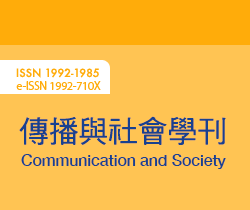我非常榮幸能在2010年參加《傳播與社會學刊》編委會,並在2011年擔任學刊主編。在我擔任主編後,學刊在2013年被臺灣社會科學引文索引資料庫(Taiwan Social Science Citation Index, TSSCI)收錄為「核心期刊」,並在2015年成為國際傳播學會(International Communication Association, ICA)的附屬學刊。
《傳播與社會學刊》能夠發展成為頂尖的中文新聞傳播學術期刊,我感到非常驕傲,更充滿無限感激。我特別感謝香港中文大學新聞與傳播學院和香港浸會大學傳理學院對學刊的支持,也衷心感謝學刊編 委會同仁的努力和付出。
本期學刊是我在主編任內負責的最後一期學刊。從下一期開始,魏然教授將擔任學刊主編。魏教授學養深厚,期刊編輯經驗豐富。在魏教授帶領下,學刊將會繼續吸引全球華人學者的優質稿件,更進一 步提升學刊的品質與國際影響力。
本期學刊共刊登一篇學術對談和六篇研究論文。學術對談由龔偉亮和呂安娜訪問帕金翰教授(David Buckingham),探討數字時代的媒介素養和媒介教育。帕金翰教授認為在數字媒介盛行的時代,民眾更需要接受系統的、全面的媒介素養教育,才能具備批判理解媒介體系與運作的能力。
在六篇研究論文中,蕭丞傑的論文從線上遊戲社群入手,結合「自我效能理論」與「關係行銷理論」,探討社群關係品質對社群協作意願的影響。他的研究發現,自我效能信念會正向影響社群承諾,同時社群效能會正向影響社群承諾與社群信任,而社群信任與社群承諾不僅具有正向關係,也會正向影響社群協作的意願。
王海燕和吳琳的論文探討中國大陸民族主義浪潮下,處於國家與大眾之間的知識分子,如何在媒體平台上扮演意見領袖的角色。通過分析主流視頻平台「今日頭條」上的國際時評視頻號,她們嘗試探討「網紅知識分子」如何借助人格、情感、事實結構等修辭手段,建構一套以「愛黨愛國」為基礎的對內保守、對外激進的民粹式民族主義話語。這一既激進又保守的民族主義話語的建構,意味著官方民族主義與大眾民族主義的合流,也揭示了網紅知識分子對政治權力與平台資本的雙重迎合。
簡廷恩、李秀珠和陳德玲的論文以「違反預期理論」為理論框架,檢視社會大眾對於企業的違反預期程度,在危機中對企業態度及企業購買意圖的影響。通過線上實驗法,他們的研究提出兩種不同類型的企業社會責任策略,探討企業、消費者與「善因契合度」的不同組合在危機應對策略中的最佳實踐。
徐翔和孫天怡的論文對新浪微博三年近八百萬條的發帖進行抽樣研究,提出平台的「熱趨同」現象。聚類分析發現,平台資訊內容類別在相似度矩陣中的中心度與其類別熱度成正比,即熱度相似的帖子,內容上的相似性也較高。這篇文章打破社交媒體內容碎片化、去中心化的普遍印象,揭示了平台高熱度內容的集中性和相似性。
王達的論文採取癥候式閱讀法,對兩岸近年來發表的紀錄片政治相關文獻進行「第二種閱讀」。在技術的驅動下,格里爾遜紀錄片理論中的「平民主義」得以凸顯,紀錄片擁有通過重構「精英/平民」的二元關係,推動多元主體間「相互賦權」和民主表達的潛能。然而,技術的政治性潛能也遭遇了新一輪政治經濟權力的重構、收編與馴化,紀錄片的「技術平民主義」面臨「權力貧民主義」的危機。這項研究結合文化政治和政治經濟的視角,檢視並反思了格里爾遜的「錘子/鏡子」論的當代發展。
路淼、羅文輝和魏然的論文結合「預設影響之影響」與「資訊處理理論」,探討香港市民對新冠疫情虛假資訊的媒介接觸、思考、預設影響,與他們對虛假資訊的態度與行為之間的關係。通過問卷調查,他們的研究發現,新冠疫情虛假資訊的接觸頻率既可以直接預測市民的三種態度與行為模式,包括對限制虛假資訊的支持度、對虛假資訊的糾正行為,以及對正確資訊的推廣行為,也可以透過「對虛假資訊的思考」與「對他人的預設影響」來間接預測這三種態度與行為模式。這項研究不僅拓展了預設影響之影響模型與資訊處理理論的適用範疇,還為政府應對、管理疫情虛假資訊提供了參考性建議。
這六篇論文在選題、理論、研究方法上都各有特點,不僅拓展現有的理論,也提出實用建議,因此對中文傳播學術研究具有相當貢獻,值得細讀。
I was honored to serve as the editor-in-chief of Communication and Society in 2011. Under my editorship, the reputation of the journal has grown tremendously, including acceptance into the Taiwan Social Science Citation Index (TSSCI) in 2013. In 2015, Communication and Society’s reputation received another boost by its acceptance as an affiliate journal of the International Communication Association (ICA). I am proud of the journal’s worldwide recognition among communication scholars as a leading Chinese-language journal devoted to studies of journalism and communication. As my term ends with this issue, I would like to take this opportunity to thank everyone who has contributed to the journal in the past years. First and foremost, I want to thank The Chinese University of Hong Kong and Hong Kong Baptist University for their support. I am also sincerely thankful to all members of the journal’s editorial board for their hard work and dedication. This is my last issue as the editor-in-chief of Communication and Society. Beginning with the next issue, Prof. Ran Wei will take over as the next editor-in-chief of the journal. I believe that Prof. Wei and his editorial team will continue to attract high-quality submissions to the journal and maintain the journal’s high standards for scholarship and impact.
This issue comprises a dialogue and six research articles that cover different topics, including media literacy, online community, the relationship between intellectual influencers and nationalism, the impact of expectancy violation on corporate crisis management, the correlation structure between popularity and centrality of the similarity network, the dynamic mechanism of documentary film politics, and the relationship among misinformation exposure, the influence of presumed influence and behavioral responses. The articles collectively represent cutting-edge research in response to challenges and issues brought by new communication technologies in Greater China.
本文引用格式:
羅文輝(2023)。〈感恩與告別〉。《傳播與社會學刊》,第65期,頁v–x。
Citation of this article:
Lo, V.-H. (2023). A few words from the outgoing editor. Communication and Society, 65, v–x.
|
